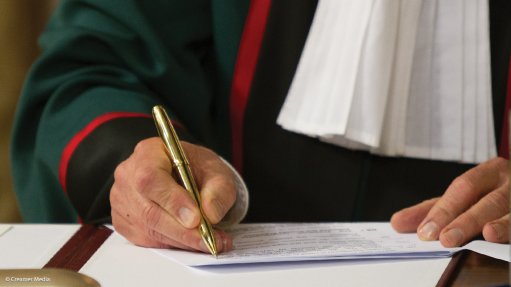
Photo by: Creamer Media
A new bill currently being drafted to replace the apartheid-era National Key Points Act should include a clause that protects journalists investigating key points in the public interest, MPs have heard.
MPs on the Portfolio Committee on Police went through a draft version of the proposed "Critical Infrastructure Bill" on Thursday, having completed the process of receiving public input.
On Thursday, the civilian secretariat of police responded to a public submission made jointly by the South African National Editors' Forum, Media Monitoring Africa and the Support Public Broadcasting coalition.
As the bill stands, anyone found guilty of serious contraventions of the security of a national key point could face severe penalties, including jail time, depending on the crime.
The three organisations recognised the importance of maintaining security at these key points, especially against criminal elements.
However, journalists could find themselves in hot water for disseminating information or taking photographs of a key point while reporting in the public interest, they argued.
Protection for employees in general
"While it is true that many of these [penalties] are subject to this being done for an 'unlawful purpose' – this term is never defined and we are concerned that this would have a chilling effect on reporting about activities taking place at critical infrastructure sites."
The bill as it stands has one clause allowing for the disclosure of such information, provided it is in accordance with any "lawful disclosure" or on the provisions of the Protected Disclosures Act, i.e. whistleblowers.
"That act [however] only provides protection for disclosure by employees, not for journalists reporting on a particular subject matter outside of his or her immediate employment," the group contended.
They submitted that the final bill should contain a public interest override to ensure, in particular, that any disclosure of information regarding a national key point would not constitute an offence if the public interest outweighed the harm of publication.
Journalists must rely on 'common law'
A representative of the civilian secretariat, Brigadier van der Walt, on Thursday responded to the submission for the committee's consideration.
He argued the bill did not limit freedom of expression in the broad sense and that journalists were covered by common law when it came to reporting.
"A public interest defence clause will go beyond what is already in the common law, and may have other unintended consequences," he said.
This would mean it would be up to a court of law to determine if the action was in the public interest, after the fact.
The penalties in the bill were also only given to those found to have compromised the "security measures" of the key point specifically, and not reporting in a general sense, he said.
If information was required, it could also be attained through the Promotion of Access to Information Act (PAIA), he added.
PAIA itself, however, is currently being reviewed following an application by My Vote Counts, based on problems of compliance.
He also argued that it would be difficult to regulate who constituted a member of the media in the age of citizen journalism.
MPs will go through the proposed bill and adopt a final version on Friday, to be sent to the National Assembly thereafter.
If adopted by the National Assembly, it will then be sent to the National Council of Provinces.
From there, following adoption, it will be sent to the Presidency to be tested for Constitutional muster, before being signed into law.